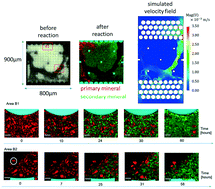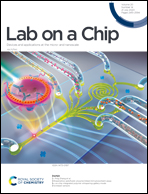Microfluidic flow-through reactor and 3D Raman imaging for in situ assessment of mineral reactivity in porous and fractured porous media†
Abstract
An in-depth understanding of dissolution and precipitation of minerals in porous and fractured porous media and the complex feedback on the transport of fluids is essential for various subsurface applications. In this context, we developed a novel non-destructive “lab-on-chip” approach for quantitative in situ assessments of mineralogical changes in porous media. Our experimental approach involves a microfluidic flow-through reactor of reactive homogeneous and heterogeneous (fractured) porous media coupled with high-resolution imaging. Here, the reactive medium consists of compacted celestine grains seeded in a reservoir within the microfluidic chip. This medium reacts with a barium chloride solution injected into the microreactor at a constant flow rate, leading to the dissolution of celestine and growth of barite. Various seeding processes of the mineral grains allow the creation of homogeneous reactive porous media or the introduction of large heterogeneities such as fractures. Hence, our approach enables high-resolution investigations of reactive transport in fractured porous media. The use of confocal Raman spectroscopic techniques enables the spatio-temporal visualization of the mineral transformation at the pore-scale in two- and three-dimensions. Moreover, advanced pore-scale modelling correlates the hydrological heterogeneities to the geochemical observations in the micro-reactor, which explains the observed discrepancies between homogeneous and heterogeneous reactive media. Eventually, the proposed methodology can be applied to other chemical systems to provide new insights into hydro-geochemical coupling in porous and fractured porous media as well as high-fidelity datasets to benchmark reactive transport codes that are currently under development.



 Please wait while we load your content...
Please wait while we load your content...